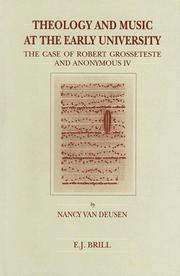| Listing 1 - 1 of 1 |
Sort by
|

ISSN: 09208607 ISBN: 9004100598 9004247114 9789004100596 9789004247116 Year: 1995 Volume: 57 Publisher: Leiden: Brill,
Abstract | Keywords | Export | Availability | Bookmark
 Loading...
Loading...Choose an application
- Reference Manager
- EndNote
- RefWorks (Direct export to RefWorks)
At the climax of one of his most important and comprehensive works, De cessatione legalium , the thirteenth-century theologian and natural philosopher, Robert Grosseteste, uses a musical example to make a point fundamental to the treatise. Music, using time as its material, located between the abstract and the concrete, served as an analogy, thus making a difficult philosophical concept perceptible. In using music as an analogy, Gorsseteste drew upon a long tradition established by Augustine, confirmed within the new Aristotelian reception, and a newly-translated Platonic dialogue. But the first rector of the University of Oxford was also demonstrating music's place within the curriculum of the early university, namely, as a ministry discipline, efficiently and efficaciously exemplifying traditional Augustinian, as well as new Aristotelian principles. This book unites the most important theological-philosophical subjects discussed by Robert Grosseteste throughout his prodigious output, with those exemplified by an anonymous contemporary English writer on music. The work shows how music collaborated with the other liberal arts, operating within the early university curriculum as a ministry discipline. Music made accessible through the figurae of its notation, and through sound, otherwise nearly unapproachable, new Aristotelian concepts. The influence was reciprocal in that new Aristotelian tools and conceptualization greatly influenced music notation and style. Music theory has been studied in isolation, as pertaining only to music. This study is the first to relate music of the early thirteenth century to its intellectual context, overturning dogma, uncritically accepted since the beginning of this century, concerning so-called “modal rhythm,” and showing how “contrary motion,” rather than forming a musical convention, demonstrated a key Aristotelian concept.
Music in universities and colleges --- Music --- History --- History and criticism --- Grosseteste, Robert, --- Knowledge --- De mensuris et discantu --- -Music in universities and colleges --- -Education, Medieval --- -#GROL:SEMI-277'12' Robe --- Education --- Medieval education --- Seven liberal arts --- Civilization, Medieval --- Learning and scholarship --- Students' songs --- Universities and colleges --- Art music --- Art music, Western --- Classical music --- Musical compositions --- Musical works --- Serious music --- Western art music --- Western music (Western countries) --- Instruction and study --- Grosseteste, Robert --- -Knowledge --- -Music --- 500-1400 --- Education, Medieval --- #GROL:SEMI-277'12' Robe --- Robertus Grosseteste --- Music. --- De mensuris et discantu. --- History. --- History and criticism. --- Music in universities and colleges - England - History --- Music - 500-1400 - History and criticism --- Grosseteste, Robert, - 1175?-1253 - Knowledge - Music --- Grosseteste, Robert, - 1175?-1253
| Listing 1 - 1 of 1 |
Sort by
|

 Search
Search Feedback
Feedback About UniCat
About UniCat  Help
Help News
News